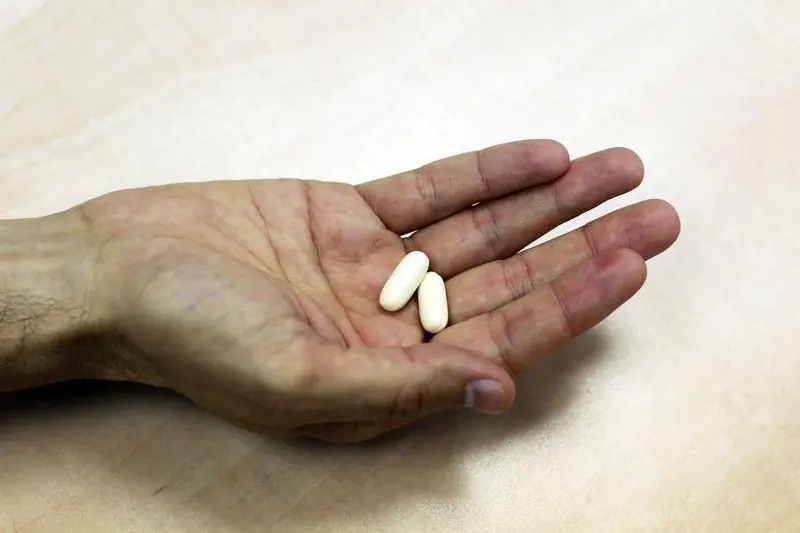PHOTO
There are six pharmacies near Ahmed Mamdouh's home in Sheikh Zayed, a western suburb of Cairo, but the soft-spoken accountant can't fill his prescriptions at any of them. He takes commonly prescribed medicines to control his cholesterol and diabetes and stave off heart disease, but for the last two months, Mamdouh, 52, can't manage to replenish his pills. "I went from being shaken down for triple the market price to being directed to a pharmacy 50 kilometers away," he says. Now he's simply being told that there is a national drug shortage.
Mamdouh is luckier than most. A Canadian passport holder, he can always buy his medicines abroad if it comes to that. The majority of Egyptians do not have that luxury. According to a March report by the pharmaceutical chamber of the Federation of Egyptian Industries, some 1,471 brand name drugs are out of stock on the local market; 300 of which have no alternative and aren't available in any other brand.
Many of these medicines are essential "life-saving" drugs, according to the report. In a December bulletin, the Ministry of Health and Population reported that there were generic equivalents or alternatives for 189 drugs currently in short supply, while 43 medicines were totally out of stock.
Medical professionals and anecdotal evidence have called those numbers into question, however. While drug shortages are nothing new here--in 2012, the health ministry set up a Drug Shortages Directorate, which published monthly tallies listing drugs that were difficult to find along with suggested alternatives--the situation has gotten exponentially worse in the wake of Egypt's hard currency crisis.
Ashraf el Khouly, a spokesman for Pfizer Egypt who is also chairman of the Egyptian Society for Pharmaceutical Research, says the situation started to seriously deteriorate in 2013, as Egypt's currency dipped and factories struggled to get their hands on dollars to pay for critical inputs. "We are having a hard time getting letters of credit to import the raw materials we need," says Khouly.
Drugs are cheap in Egypt because the government, like most European countries, sets drug prices. As a result, companies that make medicines for the local market have been burdened with increasing costs but are unable to raise prices accordingly. Egypt is a 90-million strong market full of unhealthy consumers--Egyptians suffer from disproportionately high rates of high blood pressure, diabetes and Hepatitis C, all chronic conditions that require long-term drug treatment. Thanks to this attractive "disease profile," Egypt remains a lucrative pharmaceuticals market. The local industry has continued to grow, even though prices of medicines remain among the cheapest in the world. But Khouly warns that that could soon change if conditions continue to worsen.
As in other industries, in the Nasser era, government-owned factories accounted for the vast majority of the local sector. But in the 1990s, Egypt began opening up the market to private investors and multinational firms. By 2015, investments in the pharmaceutical industry topped $3 billion.Over the years, the state has gradually relinquished control of the industry to the private sector. Today, just 11 of 137 registered pharmaceutical firms are publicly owned, responsible for manufacturing just 10 percent of the drugs Egyptians buy, according to state statistics agency CAPMAS. Around 42 percent of the medicines sold in local pharmacies are made by multinational drug companies, while another 18 percent are imports. The country's total pharmaceutical import bill in fiscal 2014/15 reached $2.7 billion, up from $1.9 billion in 2010/2011. "The government's medicine safety net is now firmly out of its hands," says Adel Abdel Maksoud, head of the pharmacy division at the Cairo Chamber of Commerce. The government can cap the price of medicines, he explains, but it can't force firms to keep manufacturing money-losing drugs, no matter how much Egyptians might need them. "If companies decide to lower or even stop production they can. It's not illegal to do so," says Abdel Maksoud.
The roots of the problems currently plaguing the Egyptian pharmaceutical industry go back years.
Keeping drug prices artificially low has come at the cost of chasing away investment and innovations that would have enabled the industry to evolve and flourish. Prior to 2009, locally made drug prices were set according to a somewhat arbitrary "cost-plus" framework in order to keep medications affordable. In practice, however, industry insiders say prices were often determined via backroom deals between manufacturers and officials. In 2009, Egypt switched to an external reference pricing system in an attempt to halt corruption and modernize the industry, bringing it more in line with the global marketplace. Under the new framework, prices of medicines were to be anchored to retail drug costs in 36 "benchmark" nations, including Canada, European states and countries in the Arab Gulf. But sloppy execution and protests from consumer groups ultimately resulted in many prices remaining artificially low. Meanwhile, the state hasn't updated drug prices since 2010.
The new pricing system was modeled on the system used by many European nations in determining drug prices for their citizens. But governments in Europe also tend to have comprehensive national health care schemes that cover all or most of the cost of medicines. Health industry experts estimate that Egyptians, on the other hand, pay on average 70 percent of their drug costs out of pocket.
Unlike fuel and staple foods, other basic commodities whose prices are fixed by the government, medicines are not subsidized at any point in the supply chain, says Ahmed Shaaban, secretary general of the Pharmacists Syndicate, an industry group. He says drug companies often temporarily cut back production of money-losing medicines. Another way firms counter losses is by diversifying into higher profit drugs such as weight loss and male performance enhancing aids, says Osama Rostom, the commercial director of the Egyptian International Pharmaceutical Industries Co., one of Egypt's biggest local drug companies. The firm exports drugs to 65 countries, he says, "But make no mistake: despite the diversification, our revenue is dropping." He places the blame squarely on Egypt's low drug prices.
According to him, some 90 of EIPICO's medicines that made money 15 years ago are no longer profitable.
The reason companies can't count on exports to make up for domestic losses is that many countries will not allow imported medicines to sell at above their local market price, explains Riad Armanious, a member of the Pharmaceutical Export Council. In Jordan, which has just seven pharmaceutical factories and does not cap drug prices, export revenues from the sector in 2015 topped $1 billion. Egypt has 137 pharma factories, yet export revenue fell to $267 million in fiscal 2014/15, down from $458 million in 2010/11, according to Central Bank data.
Adel Abdel Halim, head of the state-owned Holding Company for Pharmaceuticals, better known as Holdipharma, argues that keeping drug prices capped is essentially a tool to keep health care affordable for the poor, in lieu of a viable medical safety net for the public. "The government is trying to provide one by keeping prices down," he says. In 2009, a study by the American Journal of Pharmaceutical Education showed that Egypt has twice as many pharmacists per capita as other nations in the region.
This is likely at least partly connected to the fact that Egyptians tend to rely on pharmacies for the kind of primary care and diagnosis of minor ailments that would be left to doctors and nurses in developed countries. Egypt's health care spending is among the lowest in the region, comprising less than 6 percent of the budget, and public hospitals and clinics often don't have basic lifesaving medicines in stock.
In the past, the state could counter market driven drug shortages by simply ordering publicly owned pharmaceutical factories to ramp up production of needed medicines. But government owned factories have been hit hard in recent years. According to CAPMAS, state-owned pharma producers lost a total of LE 180 million last year, and some industry insiders predict annual losses of LE 250 million by the end of 2016. "Our losses are driven by the pound's devaluation, which started in 2011," says Abdel Halim, who says the health ministry hasn't adjusted drug prices since six years ago, when the official exchange rate was LE 5.25 to the dollar. (Late last month, the official exchange rate was LE 8.8, but forex dealers were reportedly selling scarce dollars on the black market for around LE 11.) The chief of Holdipharma, which oversees state-owned drug firms, says the combined operating costs for these factories increased from LE 380 million in 2012 to LE 700 million last year. Meanwhile, around 700 of the 1,200 medicines that they produce sell for under LE 5 a box.
Energy subsidy cuts and higher labor costs have also driven up production costs across the board. Abdel Halim says government-held factories, which are supposed to supply state-run health care facilities, can barely afford to conduct basic maintenance, let alone diversify into more profitable medicines. "The pressure is intense right now just to stay afloat," he says, adding that the role of state-owned drug factories is "a matter of national security."
Another problem is that Egyptian drug companies export very little of what they produce. Egyptians are increasingly dependent on imported drugs. In 2014/15, the country exported less than a tenth of the medicines it brought in.This trade deficit is due to a variety of factors, ranging from a lack of investment in research and development funding to an outdated regulatory system, an area in which Egypt lags "far behind" international standards, says Ahmed el Sawah of the Egyptian Center to Protect the Right to Medicine.
The larger problem, says Khouly and others, is Egypt's failure to develop R&D in pharmaceuticals has left the country unable to keep up with international advancements in the field or make its own versions of modern, state-of-the-art medicines. For one thing, Egypt lacks any legislative framework governing clinical trials, so it's very difficult for locally produced medicines to pass international standards.
Globally, the pharmaceutical sector spends around $83 billion annually just on coming up with new drugs. According to Khouly, it costs an average of $2.7 billion to develop just one new medicine.
"Under the current setup, medicine shortages will continue to repeat every few years because private firms control supply," says Shaaban, who argues that the only way to counter the current drug shortages is for the Egyptian government to reassert control over the sector. "State-owned companies need to have a strong position in the market to balance out the medicine supply."
But others say Egypt simply doesn't have the public resources to control its enormous drug market; Khouly points out that many publicly owned factories make drugs that are obsolete.
In the meantime, local pharma executives argue that the only short term solution to the shortage is to hike the prices of the cheapest medicines by 50 to 100 percent. Abdel Maksoud of the Cairo Chamber of Commerce argues that the public will be able to absorb this extra cost, since the prices of many pharmaceuticals have been kept so cheap for so long. "The entire medical matrix from doctors to hospitals is already getting more expensive, but not medicine," he says. Paradoxically, keeping drug prices so low has now imperiled Egyptians' access to critical medicines. Tales are common of desperate citizens being forced to pay 10 times the local price for imported drugs in the absence of locally made versions.
Health ministry officials did not respond to requests for comment. However, government representatives have in recent months repeatedly denied to local talk show hosts that there is a drug shortage, advising Egyptians who can't find their medicines to "call the ministry hotline." Repeated calls to that number last month on various days and times all went unanswered.
"It's unclear to us whether the government wants the pharmaceutical industry to walk a tightrope, be left to fade away like the cotton industry or make something good out of this sector," says Khouly. He argues that something must be done soon to solve Egypt's chronic drug shortages. However, "first we need to admit that there is a problem."
© Business Monthly 2016





















